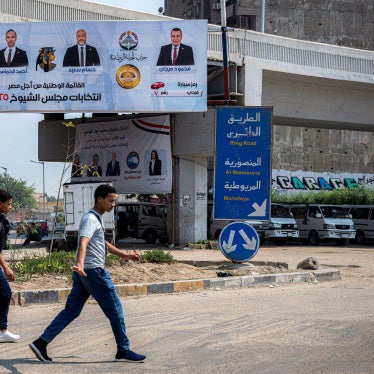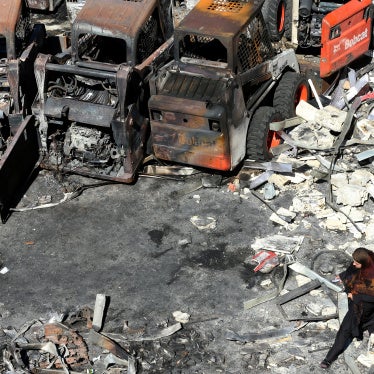The Egyptian government's abrupt renewal of the country's repressive Emergency Law on February 23 is designed to quash the growing campaign for the abolition of the law, Human Rights Watch said today.
The government introduced the bill to extend the law in the People's Assembly (Maglis al Sha'b) without prior notice and rushed it to passage the same day. The ruling National Democratic Party dominates the 454-seat People's Assembly.
"The Egyptian authorities demonstrated their fear of public scrutiny by the speed and stealth with which they renewed this deeply unpopular law," said Hanny Megally, executive director of the Middle East and North Africa division of Human Rights Watch. "This approach shows real contempt for the government's democratic processes."
Egypt has been governed under Emergency Law No. 162 of 1958 almost continuously since 1967. The law gives the authorities extensive powers to suspend basic liberties including:
arresting suspects at will and detaining them without trial for prolonged periods;
referring civilians to military or exceptional state security courts whose procedures fall far short of international standards for fair trial;
prohibiting strikes, demonstrations and public meetings,
and censoring or closing down newspapers in the name of national security.
The law, which must be renewed every three years, had been due to expire in May 2003. Widespread reports that the government would attempt to move up the date for renewal had prompted civil society groups, including human rights organizations, to organize a campaign against the law's renewal.
Thousands of dissidents, particularly members of Islamist organizations such as the Muslim Brotherhood, have been detained under the Emergency Law in recent years. Some have been held for years under continuously renewed administrative detention orders, without charge, trial or legal recourse. Torture by State Security Intelligence (SSI) forces during detention is widespread. In recent weeks, opponents of a possible war in Iraq have also been detained under the Emergency Law. One of them, Kamal Khalil, founder of the Center for Socialist Studies in Cairo and an antiwar activist, went missing on February 18. State Security officers have privately told family members that he is in detention, but his whereabouts are unknown. He suffers from asthma and is recovering from recent major surgery; family members have been unable to deliver him urgently needed medicines.
Defending the law during the very brief People's Assembly debate, government officials cited the war on terrorism as one of the main justifications for renewal. Kamal El-Shazly, Minister of State for People's Assembly and Consultative Council Affairs, reportedly cited as a model the anti-terrorist legislation in the United States, which he noted had greatly expanded police powers since September 11, 2001.
Only 30 members of the 454-member Assembly, all from opposition parties, voted against renewing the enabling law. They noted that Egypt has experienced no significant terrorist attacks for more than three years.
"This vote exemplifies the opportunism of governments exploiting the threat of terrorism to restrict their own people's rights and freedoms," said Megally. "The real emergency in Egypt is the government's renewal of the Emergency Law for another three years."







